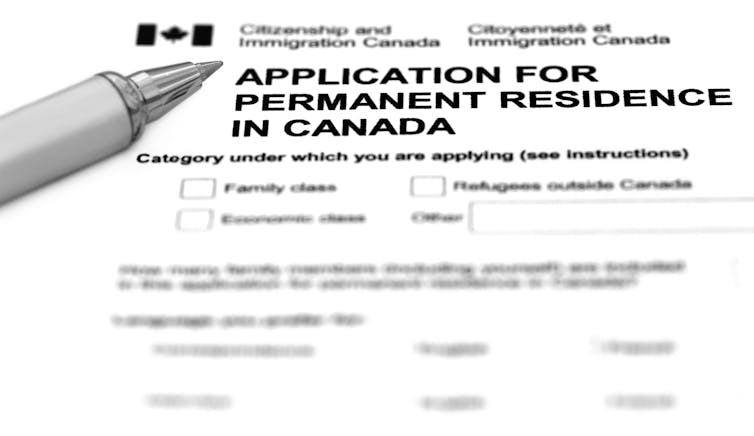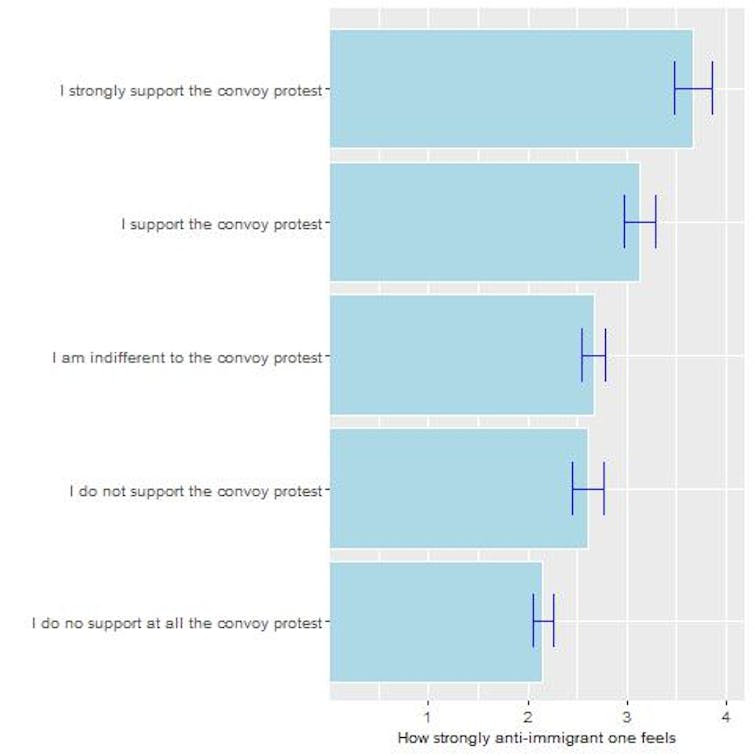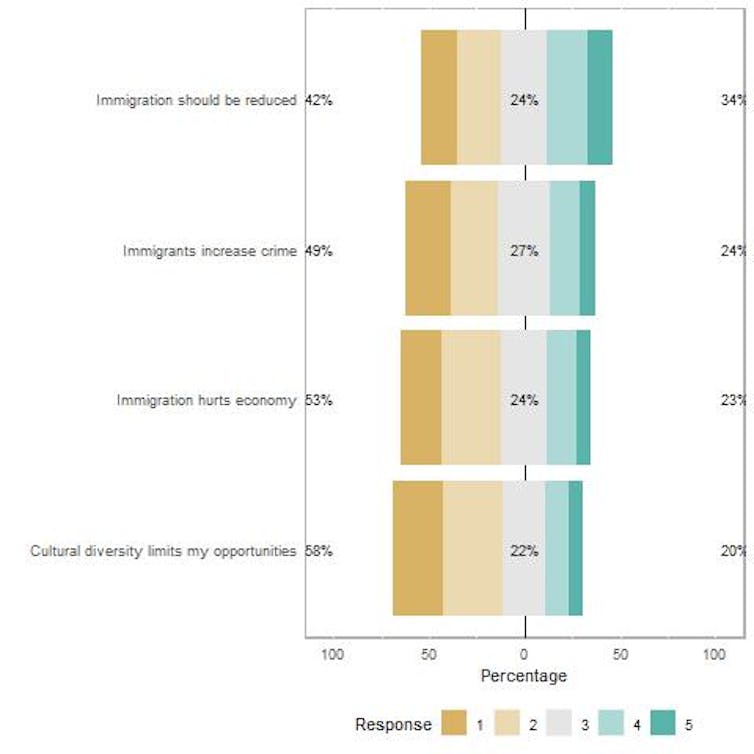While most Canadians do not reveal strong anti-immigrant sentiments, they are less immigrant-friendly than we might expect. (Shutterstock)
THE CONVERSATION
Published: December 20, 2022
Hostility towards immigrants has become a powerful component of right-wing populism in several western countries. But for the time being, Canada has not succumbed to this wave.
In Canada, attitudes towards immigration have never been a particularly divisive or salient election issue. Maxime Bernier’s People’s Party of Canada is the only federal party whose platform includes radical reform of Canada’s immigration system. Nonetheless, the party has twice failed to gain any seats in parliament.
Reinforcing the idea that multiculturalism lies at the centre of Canadian identity, a recent Focus Canada report finds that the public “has never been more supportive” of immigrants.
Our ongoing research into anti-immigration attitudes is primarily motivated by recent xenophobic attacks which expose a resurgence in anti-immigrant feelings. For instance, the 2021 London, Ont. hit-and-run, described by the prime minister as a “terrorist attack,” which killed four members of a Muslim family, shocked many Canadians. A man facing terror-related murder charges is scheduled to stand trial in September 2023.
In 2020, Canadian police reported 2,669 criminal acts motivated by hatred —the largest number recorded since 2009
Published: December 20, 2022
Hostility towards immigrants has become a powerful component of right-wing populism in several western countries. But for the time being, Canada has not succumbed to this wave.
In Canada, attitudes towards immigration have never been a particularly divisive or salient election issue. Maxime Bernier’s People’s Party of Canada is the only federal party whose platform includes radical reform of Canada’s immigration system. Nonetheless, the party has twice failed to gain any seats in parliament.
Reinforcing the idea that multiculturalism lies at the centre of Canadian identity, a recent Focus Canada report finds that the public “has never been more supportive” of immigrants.
Our ongoing research into anti-immigration attitudes is primarily motivated by recent xenophobic attacks which expose a resurgence in anti-immigrant feelings. For instance, the 2021 London, Ont. hit-and-run, described by the prime minister as a “terrorist attack,” which killed four members of a Muslim family, shocked many Canadians. A man facing terror-related murder charges is scheduled to stand trial in September 2023.
In 2020, Canadian police reported 2,669 criminal acts motivated by hatred —the largest number recorded since 2009
.
The Canadian government recently announced plans to welcome 500,000 new permanent residents a year by 2025. Research shows that despite rising hate crimes most Canadians are supportive of immigration. (Shutterstock)

The Canadian government recently announced plans to welcome 500,000 new permanent residents a year by 2025. Research shows that despite rising hate crimes most Canadians are supportive of immigration. (Shutterstock)
Anti-immigrant sentiments exist, but no province stands out
We conducted a survey in September 2022 with Canadian polling firm Abacus Data on a sample of 1,000 respondents across Canada. We asked four questions:
1) Whether immigration hurts the economy.
2) Whether the number of immigrants should be reduced.
3) Whether immigrants increase crime.
4) Whether cultural diversity limits opportunities for Canadians. By “opportunities,” we mean in areas such as jobs, education and housing.
Previous studies revealed that some provinces were less welcoming to immigrants than others. In 2019, pollsters EKOS politics found that 40 per cent of Canadians were apprehensive about “visible minority” immigrants.
EKOS reported that 56 per cent of Albertans, 46 per cent of Ontarians and 31 per cent of British Columbians echoed this sentiment. Only residents of Atlantic Canada were more immigrant friendly. Similarly, a 2021 report by Maru Public Opinion found that only half of Canadians believed that Alberta was a welcoming place for immigrants.
However, we found no significant differences across Canadian provinces in anti-immigrant sentiments. Furthermore, our research suggests that the majority of respondents do not hold strong anti-immigrant views.
We conducted a survey in September 2022 with Canadian polling firm Abacus Data on a sample of 1,000 respondents across Canada. We asked four questions:
1) Whether immigration hurts the economy.
2) Whether the number of immigrants should be reduced.
3) Whether immigrants increase crime.
4) Whether cultural diversity limits opportunities for Canadians. By “opportunities,” we mean in areas such as jobs, education and housing.
Previous studies revealed that some provinces were less welcoming to immigrants than others. In 2019, pollsters EKOS politics found that 40 per cent of Canadians were apprehensive about “visible minority” immigrants.
EKOS reported that 56 per cent of Albertans, 46 per cent of Ontarians and 31 per cent of British Columbians echoed this sentiment. Only residents of Atlantic Canada were more immigrant friendly. Similarly, a 2021 report by Maru Public Opinion found that only half of Canadians believed that Alberta was a welcoming place for immigrants.
However, we found no significant differences across Canadian provinces in anti-immigrant sentiments. Furthermore, our research suggests that the majority of respondents do not hold strong anti-immigrant views.
Four questions to measure anti-immigration beliefs. Left-side percentages show tolerance; middle percentages show neutral feelings; right-side percentages show strong anti-immigration feelings. (Author provided)
When asked whether “immigration hurts the economy,” 53 per cent disagreed. While Canadians do not reveal strong anti-immigrant sentiments, they are less immigrant-friendly than we expected. We found that 24 per cent of the respondents do not have an opinion on immigration, while 23 per cent agree that immigration hurts the economy.
Moreover, 34 per cent of Canadians agreed that “immigration should be reduced.” Twenty-four per cent agree that “immigrants increase crime” and 20 per cent agree that “cultural diversity limits their opportunities.”
When asked whether “immigration hurts the economy,” 53 per cent disagreed. While Canadians do not reveal strong anti-immigrant sentiments, they are less immigrant-friendly than we expected. We found that 24 per cent of the respondents do not have an opinion on immigration, while 23 per cent agree that immigration hurts the economy.
Moreover, 34 per cent of Canadians agreed that “immigration should be reduced.” Twenty-four per cent agree that “immigrants increase crime” and 20 per cent agree that “cultural diversity limits their opportunities.”
Attitudes within the immigrant population
Our study shows that recent immigrants to Canada are more tolerant to immigration than those who immigrated in the distant past, but the differences are rather small. Other researchers have arrived at a similar conclusion when examining immigrants’ attitudes toward immigration.
Those who have acquired citizenship in their host countries tend to be more skeptical about immigration than newer non-citizen immigrants. There could be several hypotheses that explain this trend, however, more research is needed to shed light on why that might be.
Anti-immigrant attitudes stronger among convoy supporters
Prime Minister Justin Trudeau described the truckers’ protest in Ottawa in early 2022 as imbued with “symbols of hatred and division” and accused protesters of “abuse and racism.” In contrast, the convoy was endorsed by prominent American right-wing figures including Donald Trump and Fox News commentators
.
Supporters of the ‘freedom convoy’ tend to hold stronger anti-immigrant views. (Author provided)
We found that stronger support for the convoy movement is associated with stronger anti-immigrant feelings. This finding lends some credence to Trudeau’s sentiment that racism and xenophobia were present among the convoy protesters.
We found that moderate anti-immigrant sentiments exist in Canada, but without noticeable differences between provinces. The trucker Convoy protest supporters showcased stronger anti-immigrant attitudes than those who opposed these protests.

Supporters of the ‘freedom convoy’ tend to hold stronger anti-immigrant views. (Author provided)
We found that stronger support for the convoy movement is associated with stronger anti-immigrant feelings. This finding lends some credence to Trudeau’s sentiment that racism and xenophobia were present among the convoy protesters.
We found that moderate anti-immigrant sentiments exist in Canada, but without noticeable differences between provinces. The trucker Convoy protest supporters showcased stronger anti-immigrant attitudes than those who opposed these protests.
This might challenge Canada’s all-encompassing tradition of diversity and tolerance.
Authors
Constantin Colonescu
Associate Professor of Economics, MacEwan University

Associate Professor of Economics, MacEwan University
Andrea Wagner
Assistant Professor, Political Science, MacEwan University
Assistant Professor, Political Science, MacEwan University
Disclosure statement
Constantin Colonescu receives funding from MacEwan University (Internal funding).
Dr. Andrea Wagner received funding from MacEwan University's Scholarly Activity Support Fund
Partners


No comments:
Post a Comment